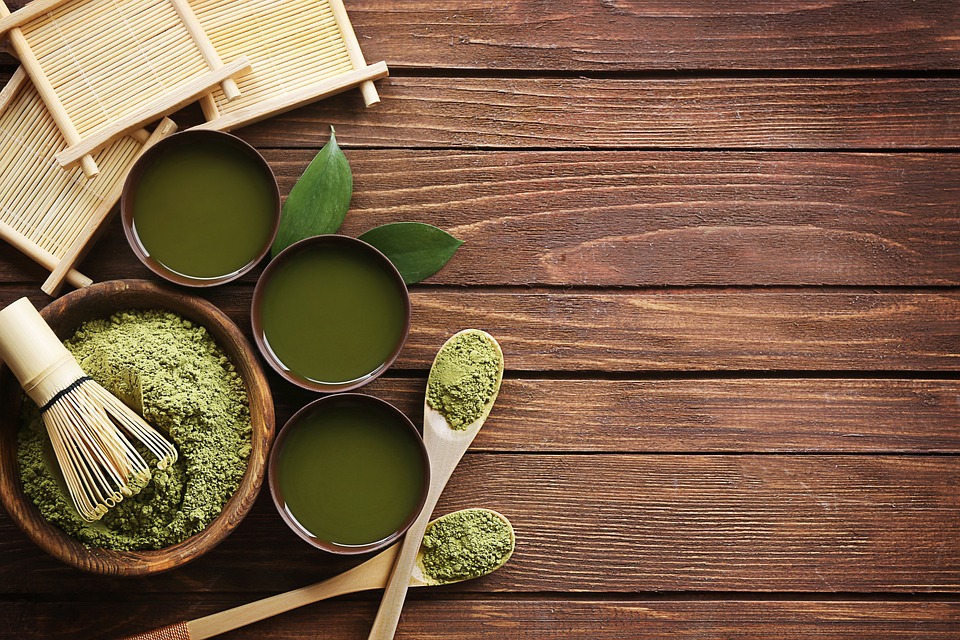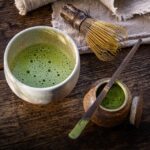The science behind why matcha makes you feel both focused and relaxed is that it contains high levels of both theanine and caffeine. Theanine is an amino acid that is known to promote relaxation, while caffeine is a stimulant that can improve focus. You’ve probably heard that matcha powder has many health benefits and adding it to your daily routine is easy and delicious.
L-theanine is an amino acid that matcha is the best and most natural concentrated source for.
Start supplementing your L-theanine naturally by drinking matcha daily
Although Joe Rogan mentions the health benefits of supplementing L-theanine on his podcast, he failed to mention that matcha is the best natural source of L-theanine.
L-theanine is an amino acid that is responsible for matcha’s sweeter taste and its ability to lower blood pressure, increase focus, reduce anxiety and stress, improve immunity, boost quality sleep, and even help aid in tumor and cancer treatment. (8)(1)
Our matcha teas are of the highest quality, and every serving is lab-tested to ensure it contains high levels of L-theanine.
Why does matcha have such concentrated amounts of L-theanine?
Matcha contains five times more L-theanine than other green teas, making it the best source of this nutrient. (20 mg versus 4 mg)
Due to the extended period of shade-growing, matcha has higher levels of L-theanine than regular green tea. Shading enhances L-theanine concentrations while direct sunlight diminishes them.
If you want to learn more about L-theanine and why drinking matcha is the best way to get it, keep reading.
Scientific Research on L-theanine and EGCG Catechins
We owe the goodness of the green matcha tea to the high content of two polyphenols, L-theanine and the EGCG catechin. On this website, you can learn about how these substances affect our bodies.
L-theanine is an amino acid that occurs naturally in tea and mushrooms. Amino acids are the building blocks of human body proteins. They are necessary for the production of insulin, adrenaline, and neurotransmitters. They also help cells renew themselves and grow new muscle. Numerous studies conducted in America and Australia have shown that L-theanine, when taken in conjunction with caffeine, can have a positive effect on cognitive function, concentration and mood. L-theanine can help to offset the stimulating effect of caffeine and can lower blood pressure. The studies at Newcastle University show that drinking matcha makes us feel more energized and less nervous.
Effective learning and memory improvement
The research showed that matcha tea improved attention and helped people concentrate on a task. People who drank green tea scored better on a learning test than those who drank a placebo drink. Green tea has a stimulating effect that can boost creative thinking.
L-theanine positively affects memory, especially the working one. Drinking green tea can help improve your problem-solving skills, according to a new study from the University of Basel. In the study, participants who drank green tea solved problems more quickly and accurately than those who didn’t drink any tea. Green tea increases connectivity between the parietal and frontal lobes, which leads to improved task performance. green tea extract might be beneficial for treating disorders such as dementia.
Concentration and reduced response time
Matcha contains two cognitively-enhancing constituents, caffeine and L-theanine, in perfect proportions. In 2017, a group of Dutch researchers looked into how matcha consumption affects our cognitive functions. Each participant had to consume one of the four test products: matcha tea, matcha tea bar (4 g matcha tea powder per item), placebo tea, or placebo bar. Then the participants performed a set of cognitive tests to assess their attention, data processing abilities, working memory, and episodic memory. Episodic memory is a person’s unique recall of a specific event. The findings of the research showed that drinking matcha improved people’s abilities to pay attention and to react quickly to stimuli.
SCIENTIFIC RESEARCH ON EGCG CATECHINS
Catechins belong to the group of polyphenols. Phytonutrients are present in many dietary items including plants, fruits, red wine, beer, cacao liquor, chocolate, cocoa, and green tea. Matcha contains the highest concentration of phytonutrients. Catheins fight bacteria, fungus and viruses. Therefore, they strengthen the immune system. Some foods can help remove heavy metals from the body and slow down the aging process. The substances in tea that are effective in scavenging reactive oxygen species are catechins and polyphenols. The most recent studies demonstrate that green tea can delay tumor growth.
The scientists found that a single bag of Starbucks green tea contained less than one-tenth the amount of EGCG present in the Japanese matcha. EGCG was found to be 137 times more concentrated in matcha than in a bagged tea. Even though high quality green tea contains three times less EGCG catheins than matcha, it is still a good quality tea.
Catheins EGCG = Antioxidants that inhibit the aging process
Catheins are polyphenols that work as powerful antioxidants. They eliminate reactive oxygen species, including free radicals and peroxides. These are damaging to cells and can cause a plethora of health issues. This is why matcha tea has an antioxidant effect that counteract the abnormal activity of reactive oxygen species. The level of reactive oxygen species in cells is kept in check by antioxidants like free radical scavengers, glutathione, tocopherols, and antioxidant enzymes. If the levels of oxidants in the body are higher than the levels of antioxidants, it can cause oxidative stress. This type of stress can damage cells, and might lead to neurodegenerative diseases such as Parkinson’s or Alzheimer’s. There is also a correlation between this and the occurrence of coronary artery disease.
Weight-loss effect
Matcha tea can help burn excess calories, reduce blood glucose and insulin levels, even without changing our eating habits. The consumption of green tea on a regular basis can help an individual burn an additional 100 calories per day, according to a meta-analysis of research findings that were published in the American Journal of Clinical Nutrition. EGCG catechins increase energy expenditure and speed up fat burning, making green tea an effective weight loss tool.
Inhibiting cancer growth processes
The catechins in green tea have been shown to be effective in inhibiting cancer growth. A recent study found that consuming 600 mg of green tea catechins every day may help to reduce the growth of prostate cancer. The incidence of cancer was 3% for those men treated with GTCs and 30% for those men who received the placebo.
Studies have also shown that EGCG can change the metabolism of cancer cells by suppressing the activation of an enzyme that is responsible for cancer growth and activity.
Catechins fighting cardiovascular diseases
A Japanese study showed that EGCG catechins in matcha can bring benefits to the heart and the circulatory system. Regular consumption of green tea has been linked with lower rates of cardiovascular mortality, according to two new studies. The findings were published in the journals JAMA and Annals of Epidemiology. The more tea you drink, the lower your risk of death, especially among women. Green tea has been shown to be effective in reducing the risk of stroke.
The catechins in green tea, especially EGCG, have anti-inflammatory and anti-clotting effects. People who consume one to four cups of green tea daily have a 20% reduced risk of stroke when compared to those who don’t consume green tea, according to a thirteen-year study of over 80,000 Japanese people.
The main green tea component, catechins, may prevent the fatal disease aortic aneurysm through their anti-inflammatory and anti-clotting effects. Atherosclerotic processes, hypertension and rapid physical efforts can all cause aneurysms. The research showed that the catechins in EGCG can help to regenerate elastin. Elastin is the main protein responsible for artery elasticity, so this could have a positive effect on heart health.
Common reasons to supplement L-theanine | How L-theanine works, according to science
L-theanine is the reason we drink matcha and feel more alert and focused.
In a 2008 study, participants were given L-theanine or a placebo before performing cognitively demanding visual-spatial tasks. According to the study, participants who were given L-theanine were more alert, productive, and better able to take on tasks that require sustained brainpower when compared to the placebo group. The study found that people who were given L-theanine in combination with caffeine had better reaction times, accuracy, and memories than those who were given a placebo. (6) (7)
L-theanine is not an essential amino-acid, but it has many incredible benefits. The research on the benefits of keeping your brain healthy is overwhelming. Brain health affects immunity, mental health, and lifespan.
L-theanine for Anxiety | L-theanine and Caffeine
Other studies have suggested that matcha’s L-theanine may improve sleep, focus, learning, and anxiety symptoms. How does the combination of L-theanine and caffeine in matcha work on a neurochemical level?
L-theanine for maximum Brain Boost
L-theanine is similar in structure to two amino acids that are essential for building proteins and keeping neurotransmitters in balance.
In the body it is absorbed by the small intestine and can be converted by the liver into active L-glutamate; however some L-theanine that is consumed isn’t first broken down, instead it can cross the blood brain barrier (BBB) to modulate many of the same glutamate receptor sites.
L-theanine for ADHD/ADD
L-theanine is important because it is similar to glutamate, which is the most abundant excitatory neurotransmitter in the brain and central nervous system. The appropriate balance of excitatory neurotransmitters is essential to avoid problems with overactivity or underactivity.
Multiple studies have looked at L-theanine’s potential benefits for the brain, including reducing damage caused by too much glutamate.
Before work, a green matcha smoothie is a great way to start your day. Our recipes for delicious and fat-reducing matcha smoothies are available now.
L-theanine for Brain Health Benefits
The latest science also recommends L-theanine as a way to increase activity on NMDA receptors. Receptors that are involved in memory, learning, and sending proper signals to muscles to produce other neurotransmitters.
L-theanine may help you focus and avoid distractions and impulses. This amino acid is similar to glutamate and is important for many of the same functions.
Reasons to supplement with matcha L-theanine for mental health
Substances in matcha have been linked to brain health, growth of neurons, and a more balanced state between neurotransmitters.
L-theanine for Neurological Health
There are multiple studies that have been reviewed by peers that show L-theanine increases the production of dopamine and serotonin in areas of the brain. This is done by promoting the production of tryptophan, which are precursors for transmitters.
L-theanine for GABA
L-theanine binds to the AMPA receptor, which encourages the release of GABA. GABA functions as an inhibitory signal for relaxation, muscle tone, and focus, and also protects from excitotoxicity.
L-theanine for BDNF
L-theanine does more than just protect the brain–it also increases levels of BDNF in the blood. BDNF is strongly associated with brain health, neuroplasticity and impulse control.
L-theanine for NGF (Nerve Growth Factor)
According to controlled studies that suggest many shared glutamatergic mechanisms, NGF is upregulated by L-theanine. This has primary roles including the maintenance, growth, and healing of neurons.
Studies have shown that the right amount of NGF, with the help of L-theanine, can Prevent Alzheimer’s and Parkinson’s Disease, and reduce the symptoms of these diseases. It’s like the perfect nutrition for your brain .



